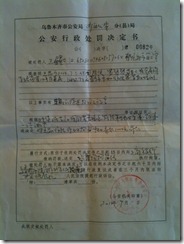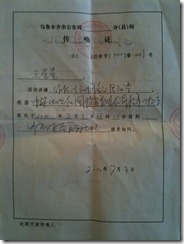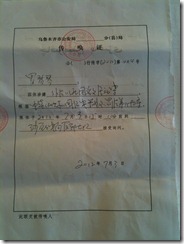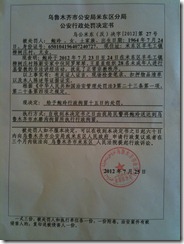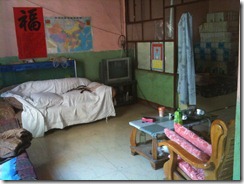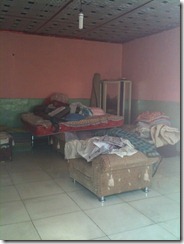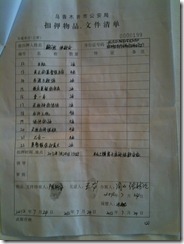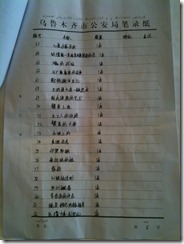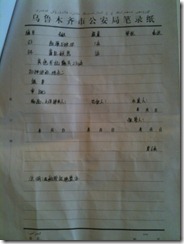China Aid Association

(Photo on the left: Notice on the law-implementation, inspection and legal handling of religious activities in Midong District of Urumqi)
Beginning on July 1, 2012, Bao Ling, Lu Xia, Wang Xingxing, Luo Qinqin and some other Christians of Urumqi City gathered 73 teenagers together for summer camp activities in a rental room at the address of No. 14, South Alley, East Road, Unit 1, Cangfanggou, Shayibak District, Urumqi, teaching the contents and culture of the Bible. On July 3, the “Department on Preventing and Handling Cult-Related Crimes” of the Public Security Bureau of Shayibak District, Urumqi, suddenly sent a “notice of summon” to Bao Ling, Lu Xia, Wang Xingxing, and Luo Qinqin, etc. requiring the nine of them to come to the “Department on Preventing and Handling Cult-Related Crimes” for questioning at 3:30pm on July 3. The summons was made on the grounds of “being on the suspicion of carrying out illegal activities in the name of social organizations.”
At 3:30pm on July 3, the nine Christian women, including Bao Ling, Lu Xia, Wang Xingxing and Luo Qinqin, arrived at the “Department on Preventing and Handling Cult-Related Crimes” of the Public Security Bureau branch office in Shayibak District on time to receive questioning. On the 4th of July, after having been questioned by the police, the Public Security Bureau branch office in Shayibak District meted out administrative punishment to the nine Christian sisters (including Bao Ling) of 14 to 15 days of detention and fines ranging from 500 to 1,000 yuan, citing the reason of “gathering teenagers for illegal Christian training activities.” On July 19, the nine sisters including Bao Ling, Lu Xia, Wang Xingxing and Luo Qinqin were released from the detention center successively, but they all refused to pay the fines.
After Bao Ling, Wang Xingxing and Luo Qinqin ware released from administrative detention by the police, they resumed the Sunday School summer camp activities for teenagers on July 20, but reduced the number of attending children to only 28. They moved the location of summer school activities to Sister Bao Ling’s home at Liushuzhuang Village, Yangmaogong Township, Midong District of Urumqi, which is a village ranch house with a courtyard.
In the afternoon of July 23, the security staff of Liushuzhuang Village took two policemen from Yangmaogong Towmship Police Station to Bao Ling’s home to inspect. Citing the excuse that Bao Ling’s dog needed to receive vaccine shots, the police made Bao Ling open the door of her home and let them in. As the police entered the courtyard and saw the twenty-plus children in the place, they asked Bao Ling to dismiss the training class for children right away and also called the Police Chief of Yangmaogong Police Station. The police chief summoned Bao Ling’s husband Chen Xin’an to the police station and asked him in person to dismiss the class held at his home. Under tremendous pressure, Bao Ling decided to dismiss the summer camp. However it was not possible them to find vehicles to send all the children back to the city, which was quite far away, by the end of the day, since it was getting late, there were many children, and transportation in the village was not readily available. Moreover, these children did not want to leave. As a result, Bao Ling decided to send them back to the city on the next day.
At about 9am on July 24, 2012, up to 10 people who claimed to be policemen forced their way into Bao Ling’s home without showing any legal papers to identify themselves. At that time, Bao Ling was chopping vegetables in the kitchen to prepare breakfast for the children. Hearing that over 10 strangers had broken into the house, Bao Ling came out of the kitchen, with the kitchen knife still in her hand. She asked these people who just broke in to show their IDs, but they refused. So Bao Ling asked them to leave. These people claimed that Bao Ling was threatening them because she asked them to leave with a knife in her hand. Then the person in charge among them made a phone call to report that someone intimidated them with a knife when they enforced the law. Shortly after the call was made, over 100 policemen and government agents arrived consecutively and surrounded the courtyard of Bao Ling’s home. Husky policemen quickly cuffed up four sisters, i.e. Bao Ling, Wang Xingxing, Luo Qinqin, and Fu Yajuan. In the commotion and collision at the scene, Bao Ling’s mother, who is over 70 years old, was pushed to the ground by the police and lost consciousness on the spot. Frightened children cried and screamed. All the people in the courtyard were forced into police vehicles, mini-buses and the vehicles of the Neighborhood Affairs Office, and taken to different places. Bao Ling, Wang Xingxing and Luo Qinqin were taken to Yangbaogong Police Station for questioning by Captain Ren of the Anti-cult Squad of Urumqi Municipal Public Security Bureau. After interrogation, Bao Ling, Wang Xingxing and Luo Qinqin were detained in the detention rooms in the basement of the police station. At 11pm that night, the three of them were taken to the detention center. Before their detention, the police only briefly showed them the Notice of Punishment Decision of 15-Day Administrative Detention. The police asked them to sign it, but the three Christian sisters refused to yield to the unjust ruling and did not sign. The cited reason for administrative detention is “gathering minors for illegal Christian Bible-teaching activities and disrupting normal religious order.” At 12pm on August 9, the three Christian sisters, i.e., Bao Ling, Wang Xingxing, and Luo Qinqin were released.
In the whole process of seizing people and searching Bao Ling’s home, the police did not show their IDs; nor did they show a search warrant. After the search, the police confiscated a large number of items from Bao Ling’s home, mainly various Bible-related materials. At the police station, the police beat the women, punching them in the head and slapping their faces while interrogating Wang Xingxing, Bao Ling and Luo Qinqin. Wang Xingxing, in particular, was struck down to the ground and brutally beaten. None of the people committing the violence at the police station was in police uniform.
After the police violently took Bao Ling, Wang Xingxing, and Luo Qinqin away, they ordered the Liushuzhuang Village to shut off electricity for Bao Ling’s home for 10 days. The supply was not resumed until 10 days later.
On August 13, 2012, the four Christian sisters, Bao Ling, Wang Xingxing, Luo Qinqin and Lu Xia hired Mr. Bright, a Christian rights defense lawyer in Beijing, to come to Urumqi to give them legal assistance. The process of administrative review was initiated to redress their grievances. Bao Ling, Wang Xingxing, Luo Qinqin, and Lu Xia filed administrative review according to the law to the People’s Government of Urumqi Shayibak District regarding the administrative punishment made on the 4th of July. And the three of them, Bao Ling, Wang Xingxing, and Luo Qinqin filed administrative review according to the law to the People’s Government of Urumqi Midong District regarding the administrative punishment made on July 25. If the government upholds the decision of the Public Security Bureau in the administrative review, the Christian sisters will start the procedure of administrative lawsuit according to the law to defend citizens’ rights of religious belief and also to provide necessary education on the law to the two branch offices and police stations of Urumqi Municipal Public Security Bureau.
China Aid Association was astounded and infuriated by this case of savage persecution and urged Urumqi Municipal Public Security Bureau to correct the wrong decisions, unlawful actions, and brutality of its two branch offices immediately, and to apologize to believers being persecuted. The social stability of Xinjiang has a significant impact on the whole nation. It is hoped that the law enforcement agencies of Xinjiang will avoid abusing power, violating the law when implementing it, and provoking the anger of the public. Otherwise, the capital city of Xinjiang will suffer more turmoil and the public will lose confidence in the authorities.
Click on small pictures to see enlarged versions: Notice of Summons, the Administrative Punishment Decision made by the police, sister Bao Ling’s home where Sunday School was held, the list of confiscated items and documents
Application for Administrative Review
Applicant: Bao Ling, female, born on July 24, 1964, Tujia ethnicity
ID: 650104196407240727
Address: #201, Unit 3, Building 8, No. 20, Taiyuan Road, New City District, Urumqi.
Telephone: 136-3991-4433
Defendant: the branch office of Urumqi Public Security Bureau in Shabayik District
Legal representative: Zhang Yue
Title: director
Address: No. 92, Youhao South Road, Shayibak District, Urumqi
Telephone: (0991) 4521607
Requests:
Rule according to law that the “Administrative Punishment Decision by police” (No. 0078) made by the defendant on July 4, 2012 is illegal and ought to be revoked according to law
Facts and reasons:
In July, 2012, during the summer break of schools, the applicant, with Wang Xingxing, Luo Qinqin, Lu Xia, etc. (nine friends in total including the applicant) taught the Christian Bible and other relevant knowledge to 73 teenagers at a self-constructed house located at No. 14, South Alley, North Road, Unit 1, Cangfanggou, Shayibak District. On July 3, 2012, the “Department on Preventing and Handling Cult-Related Crimes” headed by the defendant delivered a “notice of summon, No. 002” (2012) to the applicant, which says “Bao Ling, you are suspected of illegally carrying out activities under the name of social organizations. According to Article 82 of Law of the People’s Republic of China on Public Security Administration Punishments, you are required to come to the Anti-cult Squad of Shayibak District for questioning before 3:10 pm on July 3, 2012.” In the afternoon of July 3, the applicant came to the Anti-cult Squad of Shayibak District on time to receive questioning of the police. Without showing any legal papers, the police questioned the applicant for a long period of time, and then detained the applicant and sent the applicant to the detention center of Shuimogou District. On July 4, the defendant gave the applicant the administrative punishment of 14-days’ administrative detention and a fine of 500 yuan, citing the reason of “gathering teenagers for illegal Christian training activities”.
The applicant contends that the defendant’s administrative punishment decision has violated both legal procedures and corresponding substantive laws and ought to be revoked. Reasons are listed as follows:
I. The defendant violated legal procedures.
1. The defendant’s law enforcement agents did not show their identification papers according to law. Article 37 of the Law on Administrative Penalty says, “When administrative organs conduct investigations or inspections, there shall be not less than two law-enforcing officers, who shall show their identification papers to the party or other persons concerned.” But on July 3, 2012, the defendant’s law-enforcing officers conducted long questioning of the applicant without showing their identification papers.
2. The defendant did not fulfill the duty of informing before giving the punishment. Article 94 of Law of the People’s Republic of China on Public Security Administration Punishments says, “The public security organ shall, before making a public security punishment decision, inform the violator of public security administration of the facts, reasons, and grounds, and shall inform him of the rights that he may enjoy according to law.” But the defendant did not fulfill the duty of informing at all before making the punishment decision.
3. The defendant’s law-enforcing agents did not listen to the applicant’s statements and defense. Clause 2 of Article 94 of the Law of the People’s Republic of China on Public Security Administration Punishments says, “The violator of public security administration shall have the right to make statements and defend himself. The public security organ shall fully listen to the thoughts of the violator of public security administration, and shall check the facts, reasons and evidences as presented by the violator; where any of the facts, reasons and evidences as presented by the violator is found to hold water, it shall be accepted by the public security organ.” But the defendant did not listen to the applicant’s statements and defense at all when giving the punishment.
The above does not cover all the legal procedure violations committed by the defendant, but the violations listed here amply prove that the defendant committed severe violations of legal procedures and the defendant’s behavior of administrative punishment is unlawful and ineffective. Our country is ruled by law. Administration by law is a key component of constructing rule of law in China. Law-violating administration must be strictly prohibited.
II. The defendant’s administrative punishment is not grounded in facts.
The defendant cited in the “No. 002 Notice of Summon” (2012) that the defendant is “on the suspicion of illegally carrying out activities in the name of social organization.” The grounds for punishment laid out in the Administrative Punishment Decision made by the defendant is Clause 1, Article 11 and Clause 1, Article 54 of the Law of the People’s Republic of China on Public Security Administration Punishments. Article 54 says, “Violating the relevant provisions of the state by carrying out activities in the name of an unregistered social organization, and continuing to carry out activities after the social organization is canceled”. The defendant of this case apparently fabricated and distorted facts. The applicant is never involved in a social organization, not to mention apply to found an organization. How could she possibly have carried out activities in the name of a social organization? Not a single piece of evidence can be found in the registration files of the Civil Affairs Bureau or the Religious Affairs Bureau to prove that the applicant is involved in an existing social organization. How could the defendant fabricate such an accusation? One precondition of this punishment is “continuing to carry out activities after the social organization is canceled”. Nevertheless, the applicant has never “being cancelled” of activities, not to mention continue to carry out activities after the social organization is canceled for that matter. The defendant is respectfully requested to show proof of “having cancelled” the activities carried out by the applicant because “cancel” is a strict punishment measure implemented by state organs according to legal procedures which demand review for approval and legal papers. If the defendant cannot produce such legal papers, then the punishment imposed on the applicant in this case is neither based on facts nor grounded in the law, which obviously makes it a law-breaking administrative behavior.
III. The administrative punishment by the defendant is not grounded in the law.
1. The defendant has no right to interfere with the applicant’s freedom of religious belief. Article 36 of China’s Constitution says, “Citizens of the People’s Republic of China enjoy freedom of religious belief. No state organ, public organization or individual may compel citizens to believe in, or not to believe in, any religion; nor may they discriminate against citizens who believe in, or do not believe in, any religion.” The freedom of religious belief prescribed in the Constitution of China implies that when it comes to the freedom of religious belief of the minors, a Chinese citizen under 18 years old can receive any religious training their parents choose for them to receive because parents are the legal guardians of the minors. Law-enforcing state organs cannot cite any reason or excuse to interfere with and deprive the minors and their parents of their freedom of religious belief.
2. The applicant’s behavior is legal and shall not be interfere with by the Religious Affairs Bureau, not to mention the Public Security Bureau. Article 3 of the White Paper “The Status of Freedom of Religious Belief in China” (issued by the Information Office of the State Council on October 16, 1997) says, “all the normal religious activities conducted at the homes of religious believers according to religious customs, such as Sunday worshiping, praying, explaining the scriptures, preaching the Gospel, Mass, baptism… shall be administered by religious organizations and believers themselves and be protected by law without interference from anybody else… Religious activities conducted by Christians according to customs of Christianity at their homes such as Bible reading and praying attended primarily by family members and friends (customarily referred to by Chinese Christians as “house gatherings”) are not required to register.” Therefore, the applicant has the right to hold house gatherings at home attended primarily by family members and friends and is not required to register. Any interference from any government agency is against the law.
3. This case does not fall into the category of public security cases and the defendant has no right to handle it. Article 2 of Law of the People’s Republic of China on Public Security Administration Punishments says, “With regard to an act of disrupting public order, jeopardizing public security, encroaching upon the right of the person, the right of property or impairing social administration, if it is of social harmfulness and constitutes any crime as provided for in the Criminal Law of the People’s Republic of China, it shall be subject to criminal liabilities. If it is not serious enough to be subject to a criminal punishment, it shall, in accordance with this law, be subject to public security punishment by the public security organ.” The house gatherings the applicant held at home attended primarily by family and friends according to relevant regulations of the State Council do not have social harmfulness and do not fit with the category of social security cases. The applicant did not carry out activities in the name of a social organization and her activities have never been cancelled; therefore, it does not fit with the case of “continuing to carry out activities after being cancelled”. So the applicant’s behavior does not fit into the scope of Article 54 of Law of the People’s Republic of China on Public Security Administration Punishments. As a result, the defendant does not have the right to punish the applicant according to Law of the People’s Republic of China on Public Security Administration Punishments.
To sum up, the administrative punishment on the applicant from the defendant is illegal because it violated the legal procedures provide for in the Law on Public Security Administrative Punishments, the Law on Administrative punishment and the Law on Administrative Compulsory Enforcement, and violated Article 36 of China’s Constitution which has the supreme legal effectiveness. According to the regulations provided for in Article 6 and Article 9 of the Law on Administrative Review of People’s Republic of China, the applicant applied for an administrative review according to law, requesting the People’s Government of Shayibak District to rule according to law that the administrative punishment decision made by the defendant is illegal and to revoke according to law the administrative punishment decision made by the defendant on July 4, 2012.
Respectfully,
To the People’s Government of Urumqi Shayibak District
Applicant: Bao Ling
Date of application: August 15, 2012
Attachments:
1. A duplicate of this application
2. A copy of the “Decision of administrative punishment by the Public Security Bureau” (No. 0078) made by the defendant on July 4, 2012
3. A copy of the applicant’s ID
——————————————————————————–
Application for Administrative Review
Applicant: Lu Xia, female, born on July 17, 1961, Han ethnicity
ID: 342128196107173024
Address: No. 14, South Alley, East Road, Group 1, Cangfanggou, Shayibak District, Urumqi
Telephone: 132-0128-9898
Defendant: the branch office of Urumqi Public Security Bureau in Shayibak District
Legal representative: Zhang Yue
Title: director
Address: No. 92, Youhao South Road, Shayibak District, Urumqi
Telephone: (0991) 4521607
Requests:
Rule according to law that the “Administrative Punishment Decision by police” (No. 0077) made by the defendant on July 4, 2012 is illegal and ought to be revoked according to law.
Facts and reasons:
In July, 2012, during the summer break of schools, the applicant, with Wang Xingxing, Luo Qinqin, Bao Ling, etc. (nine friends in total including the applicant) taught the Christian Bible and other relevant knowledge to 73 teenagers at a self-constructed house located at No. 14, South Alley, North Road, Unit 1, Cangfanggou, Shayibak District. On July 3, 2012, the “Department on Preventing and Handling Cult-Related Crimes” headed by the defendant delivered a “notice of summon, No. 001” (2012) to the applicant, which says “Lu Xia, you are suspected of illegally carrying out activities under the name of social organizations. According to Article 82 of Law of the People’s Republic of China on Public Security Administration Punishments, you are required to come to the Anti-cult Squad of Shayibak District for questioning before 3:10 pm on July 3, 2012.” In the afternoon of July 3, the applicant came to the Anti-cult Squad of Shayibak District on time to receive questioning of the police. Without showing any legal papers, the police questioned the applicant for a long period of time, and then detained the applicant and sent the applicant to the detention center of Shuimogou District. On July 4, the defendant gave the applicant the administrative punishment of 15-days’ administrative detention and a fine of 1,000 yuan, citing the reason of “gathering teenagers for illegal Christian underground training activities”.
The applicant contends that the defendant’s administrative punishment decision has violated both legal procedures and corresponding substantive laws and ought to be revoked. Reasons are listed as follows:
I. The defendant violated legal procedures
1. The defendant’s law enforcement agents did not show their identification papers according to law. Article 37 of the Law on Administrative Penalty says, “When administrative organs conduct investigations or inspections, there shall be not less than two law-enforcing officers, who shall show their identification papers to the party or other persons concerned.” But on July 3, 2012, the defendant’s law-enforcing officers conducted long questioning of the applicant without showing their identification papers.
2. The defendant did not fulfill the duty of informing before giving the punishment. Article 94 of Law of the People’s Republic of China on Public Security Administration Punishments says, “The public security organ shall, before making a public security punishment decision, inform the violator of public security administration of the facts, reasons, and grounds, and shall inform him of the rights that he may enjoy according to law.” But the defendant did not fulfill the duty of informing at all before making the punishment decision.
3. The defendant’s law-enforcing agents did not listen to the applicant’s statements and defense. Clause 2 of Article 94 of the Law of the People’s Republic of China on Public Security Administration Punishments says, “The violator of public security administration shall have the right to make statements and defend himself. The public security organ shall fully listen to the thoughts of the violator of public security administration, and shall check the facts, reasons and evidences as presented by the violator; where any of the facts, reasons and evidences as presented by the violator is found to hold water, it shall be accepted by the public security organ.” But the defendant did not listen to the applicant’s statements and defense at all when giving the punishment.
The above does not cover all the legal procedure violations committed by the defendant, but the violations listed here amply prove that the defendant committed severe violations of legal procedures and the defendant’s behavior of administrative punishment is unlawful and ineffective. Our country is ruled by law. Administration by law is a key component of constructing rule of law in China. Law-violating administration must be strictly prohibited.
II. The defendant’s administrative punishment is not grounded in facts.
The defendant cited in the “Notice of Summon, No. 001” (2012) that the defendant is “on the suspicion of illegally carrying out activities in the name of social organization.” The grounds for punishment laid out in the Administrative Punishment Decision made by the defendant is Clause 1, Article 11 and Clause 1, Article 54 of the Law of the People’s Republic of China on Public Security Administration Punishments. Article 54 says, “Violating the relevant provisions of the state by carrying out activities in the name of an unregistered social organization, and continuing to carry out activities after the social organization is canceled”. The defendant of this case apparently fabricated and distorted facts. The applicant is never involved in a social organization, not to mention apply to found an organization. How could she possibly have carried out activities in the name of a social organization? Not a single piece of evidence can be found in the registration files of the Civil Affairs Bureau or the Religious Affairs Bureau to prove that the applicant is involved in an existing social organization. How could the defendant fabricate such an accusation? One precondition of this punishment is “continuing to carry out activities after the social organization is canceled”. Nevertheless, the applicant has never “being cancelled” of activities, not to mention continue to carry out activities after the social organization is canceled for that matter. The defendant is respectfully requested to show proof of “having cancelled” the activities carried out by the applicant because “cancel” is a strict punishment measure implemented by state organs according to legal procedures which demand review for approval and legal papers. If the defendant cannot produce such legal papers, then the punishment imposed on the applicant in this case is neither based on facts nor grounded in the law, which obviously makes it a law-breaking administrative behavior.
III. The administrative punishment by the defendant is not grounded in the law.
1. The defendant has no right to interfere with the applicant’s freedom of religious belief. Article 36 of China’s Constitution says, “Citizens of the People’s Republic of China enjoy freedom of religious belief. No state organ, public organization or individual may compel citizens to believe in, or not to believe in, any religion; nor may they discriminate against citizens who believe in, or do not believe in, any religion.” The freedom of religious belief prescribed in the Constitution of China implies that when it comes to the freedom of religious belief of the minors, a Chinese citizen under 18 years old can receive any religious training their parents choose for them to receive because parents are the legal guardians of the minors. Law-enforcing state organs cannot cite any reason or excuse to interfere with and deprive the minors and their parents of their freedom of religious belief.
2. The applicant’s behavior is legal and shall not be interfere with by the Religious Affairs Bureau, not to mention the Public Security Bureau. Article 3 of the White Paper “The Status of Freedom of Religious Belief in China” (issued by the Information Office of the State Council on October 16, 1997) says, “all the normal religious activities conducted at the homes of religious believers according to religious customs, such as Sunday worshiping, praying, explaining the scriptures, preaching the Gospel, Mass, baptism… shall be administered by religious organizations and believers themselves and be protected by law without interference from anybody else… Religious activities conducted by Christians according to customs of Christianity at their homes such as Bible reading and praying attended primarily by family members and friends (customarily referred to by Chinese Christians as “house gatherings”) are not required to register.” Therefore, the applicant has the right to hold house gatherings at home attended primarily by family members and friends and is not required to register. Any interference from any government agency is against the law.
3. This case does not fall into the category of public security cases and the defendant has no right to handle it. Article 2 of Law of the People’s Republic of China on Public Security Administration Punishments says, “With regard to an act of disrupting public order, jeopardizing public security, encroaching upon the right of the person, the right of property or impairing social administration, if it is of social harmfulness and constitutes any crime as provided for in the Criminal Law of the People’s Republic of China, it shall be subject to criminal liabilities. If it is not serious enough to be subject to a criminal punishment, it shall, in accordance with this law, be subject to public security punishment by the public security organ.” The house gatherings the applicant held at home attended primarily by family and friends according to relevant regulations of the State Council do not have social
harmfulness and do not fit with the category of social security cases. The applicant did not carry out activities in the name of a social organization and her activities have never been cancelled; therefore, it does not fit with the case of “continuing to carry out activities after being cancelled”. So the applicant’s behavior does not fit into the scope of Article 54 of Law of the People’s Republic of China on Public Security Administration Punishments. As a result, the defendant does not have the right to punish the applicant according to Law of the People’s Republic of China on Public Security Administration Punishments.
To sum up, the administrative punishment on the applicant from the defendant is illegal because it violated the legal procedures provide for in the Law on Public Security Administrative Punishments, the Law on Administrative punishment and the Law on Administrative Compulsory Enforcement, and violated Article 36 of China’s Constitution which has the supreme legal effectiveness. According to the regulations provided for in Article 6 and Article 9 of the Law on Administrative Review of People’s Republic of China, the applicant applied for an administrative review according to law, requesting the People’s Government of Shayibak District to rule according to law that the administrative punishment decision made by the defendant is illegal and to revoke according to law the administrative punishment decision made by the defendant on July 4, 2012.
Respectfully,
To the People’s Government of Urumqi Shayibak District
Applicant: Lu Xia
Date of application: August 15, 2012
Attachments:
1. A duplicate of this application
2. A copy of the “Decision of administrative punishment by the Public Security Bureau” (No. 0077) made by the defendant on July 4, 2012
3. A copy of the applicant’s ID
——————————————————————————–
Application for Administrative Review
Applicant: Wang Xingxing, female, born on May 15, 1986, Han ethnicity
ID: 65280119860515706X
Current address: No. 14, North Alley, Liushuzhuang, Ganqu Road, Midong District, Urumqi
Telephone: 158-9913-7525
Requests:
Rule according to law that the “Administrative Punishment Decision by the police” (No. 0082) made by the defendant on July 4, 2012 is illegal and ought to be revoked according to law
Facts and reasons:
In July, 2012, during the summer break of schools, the applicant, with Bao Ling, Luo Qinqin, Lu Xia, etc. (nine friends in total including the applicant) taught the Christian Bible and other relevant knowledge to 73 teenagers at a self-constructed house located at No. 14, South Alley, North Road, Unit 1, Cangfanggou, Shayibak District. On July 3, 2012, the “Department on Preventing and Handling Cult-Related Crimes” headed by the defendant delivered a “notice of summon, No. 005” (2012) to the applicant, which says “Wang Xingxing, you are suspected of illegally carrying out activities under the name of social organizations. According to Article 82 of Law of the People’s Republic of China on Public Security Administration Punishments, you are required to come to the Anti-cult Squad of Shayibak District for questioning before 3:10 pm on July 3, 2012.” In the afternoon of July 3, the applicant came to the Anti-cult Squad of Shayibak District on time to receive questioning of the police. Without showing any legal papers, the police questioned the applicant for a long period of time, and then detained the applicant and sent the applicant to the detention center of Shuimogou District. On July 4, the defendant gave the applicant the administrative punishment of 15-days’ administrative detention and a fine of 1,000 yuan, citing the reason of “gathering teenagers for illegal Christian training activities”.
The applicant contends that the defendant’s administrative punishment decision has violated both legal procedures and corresponding substantive laws and ought to be revoked. Reasons are listed as follows:
I. The defendant violated legal procedures.
1. The defendant’s law enforcement agents did not show their identification papers according to law. Article 37 of the Law on Administrative Penalty says, “When administrative organs conduct investigations or inspections, there shall be not less than two law-enforcing officers, who shall show their identification papers to the party or other persons concerned.” But on July 3, 2012, the defendant’s law-enforcing officers conducted long questioning of the applicant without showing their identification papers.
2. The defendant did not fulfill the duty of informing before giving the punishment. Article 94 of Law of the People’s Republic of China on Public Security Administration Punishments says, “The public security organ shall, before making a public security punishment decision, inform the violator of public security administration of the facts, reasons, and grounds, and shall inform him of the rights that he may enjoy according to law.” But the defendant did not fulfill the duty of informing at all before making the punishment decision.
3. The defendant’s law-enforcing agents did not listen to the applicant’s statements and defense. Clause 2 of Article 94 of the Law of the People’s Republic of China on Public Security Administration Punishments says, “The violator of public security administration shall have the right to make statements and defend himself. The public security organ shall fully listen to the thoughts of the violator of public security administration, and shall check the facts, reasons and evidences as presented by the violator; where any of the facts, reasons and evidences as presented by the violator is found to hold water, it shall be accepted by the public security organ.” But the defendant did not listen to the applicant’s statements and defense at all when giving the punishment.
The above does not cover all the legal procedure violations committed by the defendant, but the violations listed here amply prove that the defendant committed severe violations of legal procedures and the defendant’s behavior of administrative punishment is unlawful and invalid. Our country is ruled by law. Administration by law is a key component of constructing rule of law in China. Law-violating administration must be strictly prohibited.
II. The defendant’s administrative punishment is not grounded in facts.
The defendant cited in the “Notice of Summon, No. 005” (2012) that the defendant is “on the suspicion of illegally carrying out activities in the name of social organization.” The grounds for punishment laid out in the Administrative Punishment Decision made by the defendant is Clause 1, Article 11 and Clause 1, Article 54 of the Law of the People’s Republic of China on Public Security Administration Punishments. Article 54 says, “Violating the relevant provisions of the state by carrying out activities in the name of an unregistered social organization, and continuing to carry out activities after the social organization is canceled”. The defendant of this case apparently fabricated and distorted facts. The applicant is never involved in a social organization, not to mention apply to found an organization. How could she possibly have carried out activities in the name of a social organization? Not a single piece of evidence can be found in the registration files of the Civil Affairs Bureau or the Religious Affairs Bureau to prove that the applicant is involved in an existing social organization. How could the defendant fabricate such an accusation? One precondition of this punishment is “continuing to carry out activities after the social organization is canceled”. Nevertheless, the applicant has never “being cancelled” of activities, not to mention continue to carry out activities after the social organization is canceled for that matter. The defendant is respectfully requested to show proof of “having cancelled” the activities carried out by the applicant because “cancel” is a strict punishment measure implemented by state organs according to legal procedures which demand review for approval and legal papers. If the defendant cannot produce such legal papers, then the punishment imposed on the applicant in this case is neither based on facts nor grounded in the law, which obviously makes it a law-breaking administrative behavior.
III. The administrative punishment by the defendant is not grounded in the law.
1. The defendant has no right to interfere with the applicant’s freedom of religious belief. Article 36 of China’s Constitution says, “Citizens of the People’s Republic of China enjoy freedom of religious belief. No state organ, public organization or individual may compel citizens to believe in, or not to believe in, any religion; nor may they discriminate against citizens who believe in, or do not believe in, any religion.” The freedom of religious belief prescribed in the Constitution of China implies that when it comes to the freedom of religious belief of the minors, a Chinese citizen under 18 years old can receive any religious training their parents choose for them to receive because parents are the legal guardians of the minors. Law-enforcing state organs cannot cite any reason or excuse to interfere with and deprive the minors and their parents of their freedom of religious belief.
2. The applicant’s behavior is legal and shall not be interfere with by the Religious Affairs Bureau, not to mention the Public Security Bureau. Article 3 of the White Paper “The Status of Freedom of Religious Belief in China” (issued by the Information Office of the State Council on October 16, 1997) says, “all the normal religious activities conducted at the homes of religious believers according to religious customs, such as Sunday worshiping, praying, explaining the scriptures, preaching the Gospel, Mass, baptism… shall be administered by religious organizations and believers themselves and be protected by law without interference from anybody else… Religious activities conducted by Christians according to customs of Christianity at their homes such as Bible reading and praying attended primarily by family members and friends (customarily referred to by Chinese Christians as “house gatherings”) are not required to register.” Therefore, the applicant has the right to hold house gatherings at home attended primarily by family members and friends and is not required to register. Any interference from any government agency is against the law.
3. This case does not fall into the category of public security cases and the defendant has no right to handle it. Article 2 of Law of the People’s Republic of China on Public Security Administration Punishments says, “With regard to an act of disrupting public order, jeopardizing public security, encroaching upon the right of the person, the right of property or impairing social administration, if it is of social harmfulness and constitutes any crime as provided for in the Criminal Law of the People’s Republic of China, it shall be subject to criminal liabilities. If it is not serious enough to be subject to a criminal punishment, it shall, in accordance with this law, be subject to public security punishment by the public security organ.” The house gatherings the applicant held at home attended primarily by family and friends according to relevant regulations of the State Council do not have social harmfulness and do not fit with the category of social security cases. The applicant did not carry out activities in the name of a social organization and her activities have never been cancelled; therefore, it does not fit with the case of “continuing to carry out activities after being cancelled”. So the applicant’s behavior does not fit into the scope of Article 54 of Law of the People’s Republic of China on Public Security Administration Punishments. As a result, the defendant does not have the right to punish the applicant according to Law of the People’s Republic of China on Public Security Administration Punishments.
To sum up, the administrative punishment on the applicant from the defendant is illegal because it violated the legal procedures provide for in the Law on Public Security Administrative Punishments, the Law on Administrative punishment and the Law on Administrative Compulsory Enforcement, and violated Article 36 of China’s Constitution which has the supreme legal effectiveness. According to the regulations provided for in Article 6 and Article 9 of the Law on Administrative Review of People’s Republic of China, the applicant applied for an administrative review according to law, requesting the People’s Government of Shayibak District to rule according to law that the administrative punishment decision made by the defendant is illegal and to revoke according to law the administrative punishment decision made by the defendant on July 4, 2012.
Respectfully,
To: People’s Government of Urumqi Shayibak District
Applicant: Wang Xingxing
Date of application: August 15, 2012
Attachments:
1. A duplicate of this application
2. A copy of the “Decision of administrative punishment by the Public Security Bureau” (No. 0082) made by the defendant on July 4, 2012
3. A copy of the applicant’s ID
——————————————————————————–
Application for Administrative Review
Applicant: Luo Qinqin, female, born on Feb. 18, 1987, Han ethnicity
ID: 652322198702183029
Current address: No. 14, North Alley, Liushuzhuang, Ganqu Road, Midong District, Urumqi
Telephone: 132-0127-3977
Defendant: the branch office of Urumqi Public Security Bureau in Shabayik District
Legal representative: Zhang Yue
Title: director
Address: No. 92, Youhao South Road, Shayibak District, Urumqi
Telephone: (0991) 4521607
Requests:
Rule according to law that the “Administrative Punishment Decision by the police” (No. 0081) made by the defendant on July 4, 2012 is illegal and ought to be revoked according to law
Facts and reasons:
In July, 2012, during the summer break of schools, the applicant, with Wang Xingxing, Bao Ling, Lu Xia, etc. (nine friends in total including the applicant) taught the Christian Bible and other relevant knowledge to 73 teenagers at a self-constructed house located at No. 14, South Alley, North Road, Unit 1, Cangfanggou, Shayibak District. On July 3, 2012, the “Department on Preventing and Handling Cult-Related Crimes” headed by the defendant delivered a “notice of summon, No. 004” (2012) to the applicant, which says “Luo Qinqin, you are suspected of illegally carrying out activities under the name of social organizations. According to Article 82 of Law of the People’s Republic of China on Public Security Administration Punishments, you are required to come to the Anti-cult Squad of Shayibak District for questioning before 3:10 pm on July 3, 2012.” In the afternoon of July 3, the applicant came to the Anti-cult Squad of Shayibak District on time to receive questioning of the police. Without showing any legal papers, the police questioned the applicant for a long period of time, and then detained the applicant and sent the applicant to the detention center of Shuimogou District. On July 4, the defendant gave the applicant the administrative punishment of 15-days’ administrative detention and a fine of 1,000 yuan, citing the reason of “gathering teenagers for illegal Christian training activities”.
The applicant contends that the defendant’s administrative punishment decision has violated both legal procedures and corresponding substantive laws and ought to be revoked. Reasons are listed as follows:
I. The defendant violated legal procedures.
1. The defendant’s law enforcement agents did not show their identification papers according to law. Article 37 of the Law on Administrative Penalty says, “When administrative organs conduct investigations or inspections, there shall be not less than two law-enforcing officers, who shall show their identification papers to the party or other persons concerned.” But on July 3, 2012, the defendant’s law-enforcing officers conducted long questioning of the applicant without showing their identification papers.
2. The defendant did not fulfill the duty of informing before giving the punishment. Article 94 of Law of the People’s Republic of China on Public Security Administration Punishments says, “The public security organ shall, before making a public security punishment decision, inform the violator of public security administration of the facts, reasons, and grounds, and shall inform him of the rights that he may enjoy according to law.” But the defendant did not fulfill the duty of informing at all before making the punishment decision.
3. The defendant’s law-enforcing agents did not listen to the applicant’s statements and defense. Clause 2 of Article 94 of the Law of the People’s Republic of China on Public Security Administration Punishments says, “The violator of public security administration shall have the right to make statements and defend himself. The public security organ shall fully listen to the thoughts of the violator of public security administration, and shall check the facts, reasons and evidences as presented by the violator; where any of the facts, reasons and evidences as presented by the violator is found to hold water, it shall be accepted by the public security organ.” But the defendant did not listen to the applicant’s statements and defense at all when giving the punishment.
The above does not cover all the legal procedure violations committed by the defendant, but the violations listed here amply prove that the defendant committed severe violations of legal procedures and the defendant’s behavior of administrative punishment is unlawful and invalid. Our country is ruled by law. Administration by law is a key component of constructing rule of law in China. Law-violating administration must be strictly prohibited.
II. The defendant’s administrative punishment is not grounded in facts.
The defendant cited in the “Notice of Summon, No. 004” (2012) that the defendant is “on the suspicion of illegally carrying out activities in the name of social organization.” The grounds for punishment laid out in the Administrative Punishment Decision made by the defendant is Clause 1, Article 11 and Clause 1, Article 54 of the Law of the People’s Republic of China on Public Security Administration Punishments. Article 54 says, “Violating the relevant provisions of the state by carrying out activities in the name of an unregistered social organization, and continuing to carry out activities after the social organization is canceled”. The defendant of this case apparently fabricated and distorted facts. The applicant is never involved in a social organization, not to mention apply to found an organization. How could she possibly have carried out activities in the name of a social organization? Not a single piece of evidence can be found in the registration files of the Civil Affairs Bureau or the Religious Affairs Bureau to prove that the applicant is involved in an existing social organization. How could the defendant fabricate such an accusation? One precondition of this punishment is “continuing to carry out activities after the social organization is canceled”. Nevertheless, the applicant has never “being cancelled” of activities, not to mention continue to carry out activities after the social organization is canceled for that matter. The defendant is respectfully requested to show proof of “having cancelled” the activities carried out by the applicant because “cancel” is a strict punishment measure implemented by state organs according to legal procedures which demand review for approval and legal papers. If the defendant cannot produce such legal papers, then the punishment imposed on the applicant in this case is neither based on facts nor grounded in the law, which obviously makes it a law-breaking administrative behavior.
III. The administrative punishment by the defendant is not grounded in the law.
1. The defendant has no right to interfere with the applicant’s freedom of religious belief. Article 36 of China’s Constitution says, “Citizens of the People’s Republic of China enjoy freedom of religious belief. No state organ, public organization or individual may compel citizens to believe in, or not to believe in, any religion; nor may they discriminate against citizens who believe in, or do not believe in, any religion.” The freedom of religious belief prescribed in the Constitution of China implies that when it comes to the freedom of religious belief of the minors, a Chinese citizen under 18 years old can receive any religious training their parents choose for them to receive because parents are the legal guardians of the minors. Law-enforcing state organs cannot cite any reason or excuse to interfere with and deprive the minors and their parents of their freedom of religious belief.
2. The applicant’s behavior is legal and shall not be interfere with by the Religious Affairs Bureau, not to mention the Public Security Bureau. Article 3 of the White Paper “The Status of Freedom of Religious Belief in China” (issued by the Information Office of the State Council on October 16, 1997) says, “all the normal religious activities conducted at the homes of religious believers according to religious customs, such as Sunday worshiping, praying, explaining the scriptures, preaching the Gospel, Mass, baptism… shall be administered by religious organizations and believers themselves and be protected by law without interference from anybody else… Religious activities conducted by Christians according to customs of Christianity at their homes such as Bible reading and praying attended primarily by family members and friends (customarily referred to by Chinese Christians as “house gatherings”) are not required to register.” Therefore, the applicant has the right to hold house gatherings at home attended primarily by family members and friends and is not required to register. Any interference from any government agency is against the law.
3. This case does not fall into the category of public security cases and the defendant has no right to handle it. Article 2 of Law of the People’s Republic of China on Public Security Administration Punishments says, “With regard to an act of disrupting public order, jeopardizing public security, encroaching upon the right of the person, the right of property or impairing social administration, if it is of social harmfulness and constitutes any crime as provided for in the Criminal Law of the People’s Republic of China, it shall be subject to criminal liabilities. If it is not serious enough to be subject to a criminal punishment, it shall, in accordance with this law, be subject to public security punishment by the public security organ.” The house gatherings the applicant held at home attended primarily by family and friends according to relevant regulations of the State Council do not have social harmfulness and do not fit with the category of social security cases. The applicant did not carry out activities in the name of a social organization and her activities have never been cancelled; therefore, it does not fit with the case of “continuing to carry out activities after being cancelled”. So the applicant’s behavior does not fit into the scope of Article 54 of Law of the People’s Republic of China on Public Security Administration Punishments. As a result, the defendant does not have the right to punish the applicant according to Law of the People’s Republic of China on Public Security Administration Punishments.
To sum up, the administrative punishment on the applicant from the defendant is illegal because it violated the legal procedures provide for in the Law on Public Security Administrative Punishments, the Law on Administrative punishment and the Law on Administrative Compulsory Enforcement, and violated Article 36 of China’s Constitution which has the supreme legal effectiveness. According to the regulations provided for in Article 6 and Article 9 of the Law on Administrative Review of People’s Republic of China, the applicant applied for an administrative review according to law, requesting the People’s Government of Shayibak District to rule according to law that the administrative punishment decision made by the defendant is illegal and to revoke according to law the administrative punishment decision made by the defendant on July 4, 2012.
Respectfully,
To the People’s Government of Urumqi Shayibak District
Applicant: Luo Qinqin
Date of application: August 15, 2012
Attachments:
1. A duplicate of this application
2. A copy of the “Decision of administrative punishment by the Public Security Bureau” (No. 0077) made by the defendant on July 4, 2012
3. A copy of the applicant’s ID
China Aid Contacts
Rachel Ritchie, English Media Director
Cell: (432) 553-1080 | Office: 1+ (888) 889-7757 | Other: (432) 689-6985
Email: [email protected]
Website: www.chinaaid.org

